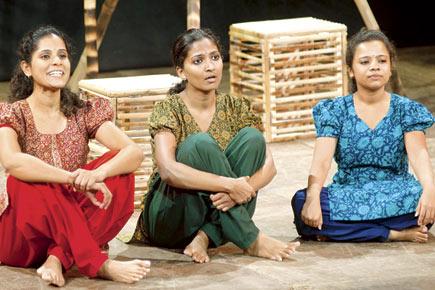Not all theatre can be experimental, but some of the best plays are the ones that don’t follow prevalent trends

 Not all theatre can be experimental, but some of the best plays are the ones that don’t follow prevalent trends.
Not all theatre can be experimental, but some of the best plays are the ones that don’t follow prevalent trends.
ADVERTISEMENT
Last week, at the Pratibimb Marathi Natya Festival, there were two plays that stuck their necks out for what they believed in. Awishkar, the group that never ceases to surprise the audience, and has the untiring efforts of Arun Kakade behind it, opened Sushama Deshpande’s new play, Aaydaan (which means objects made from bamboo).
Deshpande’s work is always unpredictable, and she has the knack of picking interesting subjects. Aaydaan is based on Urmila Pawar’s candid autobiography, in which she talks, without any sense of bitterness, about her upbringing in a poor rural Dalit family. As a little girl, she was bright and, considering her family’s circumstances, fiercely determined to get the education and employment that would get her out of poverty.

Sushama Deshpande’s new play, Aaydaan, is based on Urmila Pawar’s candid autobiography, in which she talks, without any sense of bitterness, about her upbringing in a poor rural Dalit family. Pic/Narendra Dangiya
She got married to a man of her choice, had kids, did a job, completed her BA and MA, and went on to become a famous writer and activist. It was a tough life, but one lived with hope and ambition.
Three excellent young actresses Nandita Dhuri, Shubhangi Sawarkar, Shilpa Mane played Urmila Pawar at different ages, as well as the many different characters in her life. With bare minimum props, no costume changes and hardly a pause for breath, the story of one woman’s grit unfolded on stage, with warmth and humour and a little rage.
The scene in which the Dalit families, influenced by Ambedkar, discard the idols in their homes and embrace Buddhism is quietly powerful. But, breaking one chain of caste does not free Urmila from patriarchal values built into male and female mindsets for centuries; so, her feminist writing has to be not just about women, but about Dalit women. Aaydaan is moving, revelatory and inspiring.
Sarang Bhakre’s Dushyantapriya is a brave play, which uses Kalidas’s epic Shakuntala as a narrative parallel to what the characters in a play within a play are going through. A production of Shankuntala is in rehearsal, when the actress playing the character leaves. A male actor, Rohit (Swapnil Kale), is given the female part in the age-old tradition of theatre when women were not allowed to act, so female parts were played by men; two other actors reluctantly play Shakuntala’s sakhis. Rohit falls in love with Sushil (Raj Hanchanale), who is playing Dushyant. Like in the original story, when Dushyant denied knowing Shakuntala, Sushil does not acknowledge Rohit in front of his stern older brother. The two men and the brother go through a process of soul-searching, and it is a ring that reunites the two lovers.
Bhakre’s play raises gender issues and makes a plea for acceptance, in the form of a clever retelling of the classic and turned into a highly engaging play, with very little melodrama and no preaching.
Both Aaydaan and Dushyantapriya are experimental in the best sense of the term, and would appeal to those who don’t want their entertainment pre-digested.
On the other end of the spectrum was Trivial Disasters, Atul Kumar’s star-studded version of Ajay Krishnan’s play that opened small in Bangalore, and is now taken up by an event company for an extensive countrywide tour, including places like Indore, Nagpur and Patna, which are not on the regular theatre circuit. With known names like Kalki Koechlin, Richa Chadda, Purab Kohli and Cyrus Sahukar in it, the shows get sold out pretty fast. This is an experimental play, blown to commercial proportions, and works because of the talent and charm of the actors, working with an accomplished director like Atul Kumar. Their set is practical, cheap and easily portable just a lot of cartons that are moved around as required.
The play is made up of short pieces, some of which are so insubstantial they should have been discarded right away. But, the ones that work, carry the whole production and the performances, of course; the actors look like they rehearsed properly and enjoyed their parts. Kalki was superb in two pieces, one in which she played the ditzy host of a TV show, interviewing serial killers, and another in which she plays the male owner of a suicide shop.
The funniest piece had Purab trying to say something to his parents played by Cyrus and Richa. He hems and haws and before he can blurt it out; the parents assume they know what it is. They are prepared for the revelation of his homosexuality, have joined a support group and the mother has also written a speech. Turns out that is not what he wants to disclose and they feel let down. Parents a decade ago were shocked if their sons came out of their closet; now they are dismayed if the boy is not gay!
Deepa Gahlot is an award-winning film and theatre critic and an arts administrator. You can follow her on twitter @deepagahlot
 Subscribe today by clicking the link and stay updated with the latest news!" Click here!
Subscribe today by clicking the link and stay updated with the latest news!" Click here!






